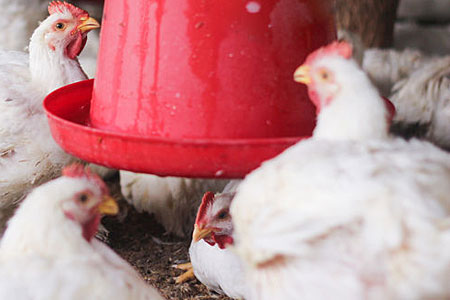
A lot of chicken keepers are fond of adding vinegar to their chickens’ drinking water. Chickens like the taste of vinegar in mild doses — one tablespoon vinegar per gallon of water. And since hens run the risk of dehydration during hot summer weather, many backyard keepers add vinegar to chickens’ water to encourage their hens to drink more. That’s not such a great idea. Here’s why:
Respiratory Alkalosis
A hen suffering from heat stress pants to help keep cool. Her rapid breathing increases the loss of carbon dioxide from her body.
Carbon dioxide is derived from bicarbonate, which is used by the blood as a pH buffer. A chicken’s lungs extract bicarbonate from the bird’s blood as carbon dioxide.
A loss of carbon dioxide therefore results in a loss of blood bicarbonate. This loss causes the hen’s blood pH, normally about 7.4, to go up — a condition called respiratory alkalosis.
Now wouldn’t you think that acidifying the drinking water with vinegar, having a pH of 2 to 3, would be a good way to reduce the blood’s pH level? Not so! Acetic vinegar has no effect on blood pH.
The blood is self-buffering. It uses the buffer bicarbonate to maintain a somewhat constant pH.
Blood Calcium
One of the results of respiratory alkalosis is a decrease in blood calcium. A hen needs calcium to make eggshells. So in hot weather hens lay fewer eggs with thinner shells. Acidifying the drinking water with vinegar reduces the availability of calcium from a hens’ diet, making things worse.
Low blood calcium also interrupts nerve impulses. The result is weak muscles, causing a hen to have trouble releasing any eggs she does lay.
Now you know that heat stress reduces blood calcium. Then why would you want to also decrease the availability of dietary calcium by adding vinegar to the drinking water?
So, What to Do?
Instead of increasing the acidity of drinking water with vinegar, reduce the acidity by adding sodium bicarbonate, which has a pH of 9. Sodium bicarbonate is the same as baking soda.
Feed grade sodium bicarbonate is less expensive than baking soda. Most farm stores sell it in 50-pound bags.
Why add sodium bicarbonate to the drinking water? Because the hen’s kidneys, on detecting that the blood is alkaline (due to respiratory alkalosis), attempt to reduce the pH by filtering out and excreting bicarbonate from the blood.
The hen uses sodium bicarbonate to restore bicarbonate in her blood. Simply add 1⁄4 cup sodium bicarbonate per gallon of drinking water. As the blood’s buffer, the bicarbonate will restore blood pH to its proper level.
Industrial egg producers know all this. That’s why they feed sodium bicarbonate to laying hens when the temperature soars.
So this summer when the weather warms, don’t add vinegar to your chickens’ drinking water. Instead, reach for the baking soda. Your hens will thank you for it.
And that’s today’s news from the Cackle Coop.
Gail Damerow is author of The Chicken Health Handbook, which includes an extensive discussion on the pros and cons of adding vinegar to chickens’ drinking water.


Great information!!! Thanks!